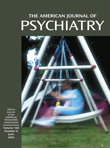Long-Acting Injectable Risperidone: Efficacy and Safety of the First Long-Acting Atypical Antipsychotic
Abstract
OBJECTIVE: The authors assessed the efficacy and safety of the first long-acting atypical antipsychotic (long-acting injectable risperidone) in patients with schizophrenia. METHOD: In a 12-week, multicenter, double-blind, randomized study, patients received intramuscular injections every 2 weeks of placebo or long-acting risperidone (25 mg, 50 mg, or 75 mg). The primary measure of efficacy was the change in total score on the Positive and Negative Syndrome Scale. RESULTS: Of the 554 patients who were enrolled, 400 entered the double-blind study, and 370 received at least one postbaseline assessment. Mean changes in score of –6.2, –8.5, and –7.4 on the Positive and Negative Syndrome Scale were seen at endpoint for the 25-, 50-, and 75-mg risperidone groups, respectively; all three change scores were significantly different from that seen with placebo (+2.6). Improvements in positive and negative symptoms were also significantly greater in patients receiving risperidone. Long-acting risperidone was well tolerated. Adverse events related to extrapyramidal symptoms were spontaneously reported by 13% of patients receiving placebo and 10% of patients in the 25-mg risperidone group, with higher rates in the 50-mg and 75-mg groups. Severity of extrapyramidal symptoms was mild at baseline and throughout the trial in each treatment group. Mean weight changes were small in the 25-, 50-, and 75-mg risperidone groups (0.5 kg, 1.2 kg, and 1.9 kg, respectively). Injection site pain was rated as low by the patients, consistent with the investigators’ pain ratings. CONCLUSIONS: Long-acting injectable risperidone was efficacious and well tolerated and provides both clinicians and patients with a new mode of treatment that can improve the outcome of long-term therapy.



